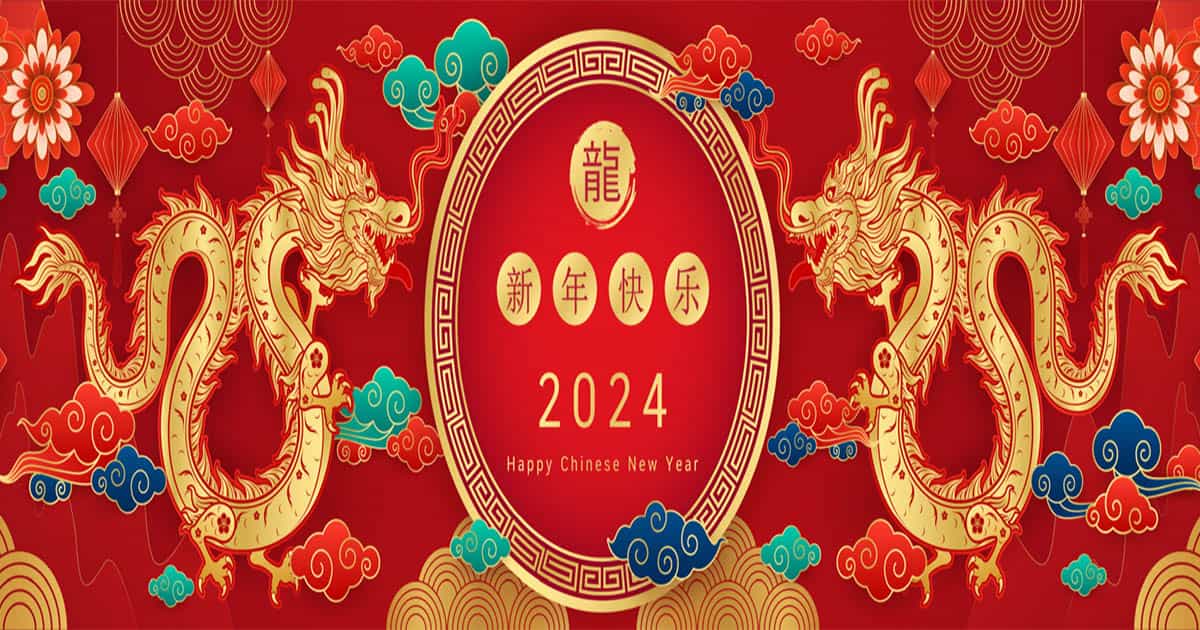Chinese New Year 2024

Chinese New Year 2024
The first day of the Chinese New Year falls on the second new moon after the winter solstice. It ends 15 days later on the full moon. “Chinese New Year 2024”. Which means, the date of the Chinese New Year changes each year, but is always held between 21st January and 20th February,as the Chinese year follows the lunar calendar.
When is it celebrated?
This year, Chinese New Year is on Saturday 10th February and it is the year of the Dragon Zodiac.
The Chinese New Year is also known as the Spring Festival. This is a time for Chinese families to cleanse their house to sweep away ill fortune and make room for good luck, as well as welcome the coming warmer weather. You will see doors decorated with red coloured paper cutouts with themes of “happiness” and “wealth.”
On Chinese New Year’s Day, there are lots of celebrations with family visits and New Year festivities. The fun activities include dragon dances, setting off firecrackers, and worshipping ancestors.
Public Holiday
About one third of the world celebrates Chinese New Year, is a public holiday in China and other countries such as Brunei, Indonesia, Malaysia, North Korea, Singapore, South Korea, and Vietnam. Chinese New Year is the busiest holiday period in the world, with billions of people traveling to spend the holidays with their family.It typically lasts seven consecutive days from Chinese New Year’s Eve to the sixth day after Chinese New Year’s Day.
2024 Lunar New Year Animal ?
For both the Chinese New Year and Vietnamese Tet, 2024 is the year of the dragon, the fifth animal in the 12 year Chinese zodiac.
Good Harvest & Good Business
The Chinese traditionally celebrate the beginning of a new year of farm work and wish for a good harvest to come. China’s farming cycle is supposed to start soon after this, but it actually depends on the location , the ground doesn’t thaw in some places in China until
March. However, traditions have changed a little. Today, people celebrate the start of a new business year and wish for profits and success.
Bad Luck During Chinese New Year?
There are different practices for cleaning the house over the New Year period. Largely speaking, people would not sweep the floor on New Year’s Day or if they do, they would not dump rubbish or throw water outside the house.
Anything collected from the broom should be kept inside the house, as throwing it out would mean parting with wealth for the coming year. It’s also important that when sweeping the floor, one must not sweep in to someone’s feet, because it would bring bad luck to them in times to come.
People would not leave the house through the back door on New Year’s Day, either older family members would not scold kids, even if they do not behave themselves as they should.
Chinese New Year’s Myths and Stories?
There are various mythical stories about the Chinese New Year, popular in different regions of the country.
According to one story, once upon a time there was a world of ghosts. In it there was a mountain with a big peach tree expanding over a vast landscape. On top of this tree nestled a golden rooster. Each morning when the rooster crowed, all the ghosts would hurriedly return from their night out. At the entrance to the ghost world sat two Door Gods on each side of the gate. If a returning ghost was found to have done harm or evil the night before, it would be punished by the Door Gods. This is the origin of the couplets that people display during the Spring Festival, they are believed to have the power of stopping evils and bad luck.
Unicorn Beast
Another story tells of a unicorn beast in ancient times in China. The unicorn was called Nian and was fiercely aggressive. It lived on the sea bottom but would go ashore to loot livestock and hurt people. “Chinese New Year 2024”. Every year when it was near the New Year’s Eve the villagers, young and old, would escape into the bushes and hide themselves from the beast.
Once, there came an elderly man, who declared he had the magical power of fending off this beast. So one night when the beast appeared again, intending to loot the village, firecrackers suddenly went off from nowhere, explosive and noisy. Then came the elder in a red robe, laughing out loud.
Seeing this the beast became frightened and fled in embarrassment. From then on, every year the villagers would set off fireworks and decorate their homes with red materials. Gradually this has become a tradition to celebrate the New Year with noisy sounds and red decor.
Be Ready In Advance
Clean your home and get a haircut before New Year’s Day. By cleaning your house you sweep away bad luck and invite good fortune, a new haircut may stop evil spirits from recognizing you and following you into the new year.
But plan your hair related activities wisely because washing your hair on New Year’s Day will flush all the good luck down the drain. The same goes for having debt, asking for a loan or being too close to scissors all of them, including crying, are bad omens.
What to Wear
If you’re not sure what to wear for the occasion, opting for something red is a good choice. The reasoning being that in Chinese culture, the colour red is associated with happiness and good luck. So your holiday wardrobe should include lots of red clothes including red underwear. “Chinese New Year 2024”. And if you haven’t got anything to wear, it’s also the perfect excuse to take a shopping trip. Wearing something new is associated with bringing renewed luck for the year ahead.
What to Say
“Happy New Year” in Chinese is “Xīnnián kuàilè”.
What to Eat
Since the festivities last 15 days, there are plenty of chances to gather at the family table. Eight is the lucky number in Chinese culture, so a lot of the meals consist of eight courses that might include a whole fish to bring good luck or a glazed duck to ensure happiness. Uncut noodles and long beans represent longevity while tangerines and pomelos bring wealth and luck. “Chinese New Year 2024”. Sweet rice balls are usually eaten on the 15th day of the celebrations and represent togetherness.
And if you want to attract prosperity, make sure you eat loads of dumplings. They look like coins and may help you make more money in the new year.
Chinese New Year Decorations
Decoration is a big part of Chinese New Year celebration. People spend substantial time and effort to uplift their houses and the immediate surroundings in order to welcome the Gods of Wealth. There are said to be two Gods of Wealth, one God of Civil and one God of Military.
People fix up paper cuts on windows and folk paintings on walls, hang red lanterns in and outside their houses, display couplets on doors, hang a big Chinese character LUCK on the main entrance and so on.
In some parts of northern China this Chinese character is often hung upside down, because the term “upside down” sounds like “arriving” in Mandarin Chinese. Thus an upside down LUCK would mean LUCK arriving there.
Streets, city squares and other public places are also decorated with banners, flags, flowerpots, orange trees and so on in order to boost the festive atmosphere. Peach, plum and daffodils are mostly seen because they are thought to bring good luck.
What to Look Forward to The Most
The lantern festival and the dragon and lion dances mark the end of the festivities and are beautiful spectacles to witness. Dragons and lions dance in parades, scare away evil, and bring good luck, wisdom and a long life. “Chinese New Year 2024”. The lanterns come in all shapes, sizes and materials including riddles for people to guess.
Last but not least, elaborate fireworks make sure every last evil spirit has been scared away.
Lion and Dragon Dances on Chinese New Year
Traditionally if anyone happened to see any of the ‘Lucky Mascots’ on New Year’s Day. They’d be very lucky for the year to come. The four ‘Lucky Mascots’ are Dragon, Phoenix, Unicorn and Dragon Turtle. They are fictional animals either living in the sea or flying in the sky. This explains why people perform Lion and Dragon dances to celebrate the New Year.
Other Traditions
Another Chinese New Year tradition involves the older generation handing out red envelopes or packets (Hong Bao) filled with money. “Chinese New Year 2024”. The envelopes are commonly given to children from their parents, grandparents or others. The reason for this is not so much to do with the money inside. But as with wearing something red, the colour is supposed to be lucky. And it’s a way to send good wishes.







